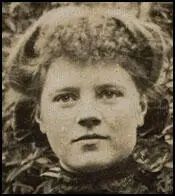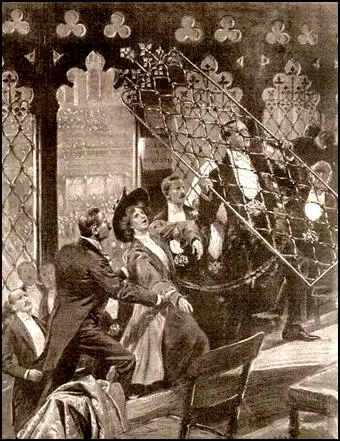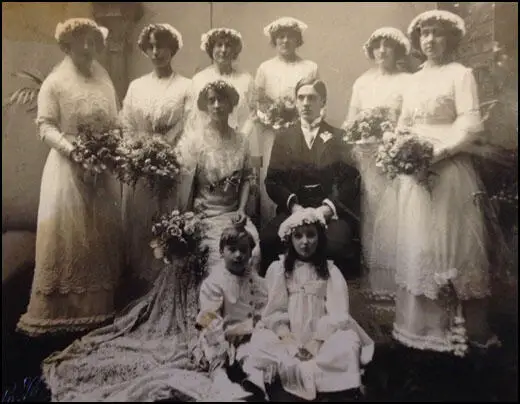Barbara Duval

Barbara Diederichs Duval, the daughter of Emily Duval and Ernest Duval, was born in Battersea on 11th September 1888.
Her mother gave birth to eight other children: Ernest (1882), Victor (1885), Walter (1887), Norah (1891), Elsie (1893), Winifred (1895), Gurney (1897) and Ivy (1901). The family lived at 52 Wycliffe Road, Battersea. (1)
Emily Duval was a supporter of women's suffrage and she joined the Women Social & Political Union (WSPU) in 1906 but left for the Women's Freedom League (WFL) in 1907 where she served as chair of the Battersea branch. Barbara also joined the organisation. (2)
On 13th October, 1908, Barbara Duval and a male friend, Henry Towning, an insurance agent, were arrested and charged with causing an obstruction by playing a barrel organ in Sackville Street, Piccadilly. (3) Towning was accused of playing the music and Duval of giving out WFL leaflets and handbills. In court, Duval wore a "Votes for Women" ribbon. Found guilty they were "bound over". (4)
On 28th October 1908 Muriel Matters organised a Women's Freedom League demonstration that would gain the maximum publicity. Matters and Helen Fox were in the ladies' gallery of the House of Commons, then enclosed from the rest of the chamber by a metal grille. The two women interrupted the business of the house by demonstrating for women's suffrage. "While attached to the grille Matters, by a legal technicality, was judged to be on the floor of Parliament and thus, the words spoken by her that day are still considered to be the first delivered by a woman in the House of Commons." (5)

When officials made attempts to remove them, it was discovered that they had chained and padlocked themselves to the grille in such a way that in order to remove them the grille would have to be removed as well. The two women sat in a committee room until a locksmith was found to separate them from the thirty-foot long grille. (6)
Muriel Matters then went round to join the demonstration taking place in front of Parliament. Fifteen arrests were made including Barbara Duval, Emily Duval, Muriel Matters, Violet Tillard, Alison Neilans, Arnold Cutler, Edith Bremer, Margaret Henderson and Marion Leighfield. (7)
Emily and Barbara Duval were charged with disorderly conduct. Emily paid her fine and Barbara was released after promising to refrain from further militancy until she was twenty-one. At her trial, Emily was described as "a lady agitator who was bringing up her daughter to be a lady agitator". (8)
As soon as she was twenty-one she took an active role in the fight for women's suffrage. In November 1911, along with her mother Emily Duval and her brother Victor Duval, she took part in a Women Social & Political Union window smashing campaign. (9)

Una Dugdale and Victor Duval are in the centre of the photograph. (13th January, 1912)
On 13th January 1912 Victor Duval married Una Dugdale, an active member of the Women Social & Political Union (WSPU). Barbara Duval was one of the bridesmaids. Margaret Nevinson later pointed out in The Vote, the newspaper of the Women's Freedom League, that the wedding had "the unique experience of a ceremony where bride and bridegroom, bridegroom's mother, most of the bridesmaids, and many of the guests had all suffered terms of imprisonment." (10)
It was announced that the word "obey" would be omitted from the marriage service at the Savoy Chapel. However, the Archbishop of Canterbury, sent his representative to tell the Rev. Hugh Chapman, that the omission would make the validity of the marriage doubtful. "The couple acquiesced, and the usual marriage ceremony was proceeded with." (11)
In the Pall Mall Gazette, the vicar who officiated at her wedding, Hugh Chapman, argued that there should be a discussion on the wording of the wedding service. "The intention of a true marriage is that the service entered on should be altogether mutual and equal, each glorying in a deference which crowns the other without the smallest lowering of themselves. It would most assuredly be a good work and is clear case for a referendum to the clergy, if their opinions on the whole subject were canvassed throughout." (12)
It was reported in the Aberdeen Press and Journal that the story had begun a national debate on the subject. Millicent Leveson-Gower, Duchess of Sutherland, stated that "obey" an unnecessary word. "Love and honour" stand much stronger without it. Jennie Spencer-Churchill, the wife of George Cornwallis-West said that although the "husband should be recognised as the head of the house between two people who are admittedly to the companions, the word is grotesque." The newspaper quoted Lena Ashwell and Beatrice Harraden as saying they would have the word "obey" left out of the wedding service. (13)
As Catherine Blackford pointed out: "Marriage reform had long been a feminist concern and Duval's standpoint signified a feminist commitment to marriage as an equal partnership based on love and respect rather than subservience and subordination." (14) Later that year she explained her reasons for departing from convention in her pamphlet Love and Honour but not Obey. (15)
Barbara Duval married Denis Gerald Barry in 1915. He served in the British Army during the First World War. (16)
Barbara Duval Barry died of influenza at the South London Hospital for Women, Clapham Common, on 1st January, 1919.
Primary Sources
(1) Sheffield Evening Telegraph (13th October 1908)
At the Marlborough Street Police Court today, Barbara Duval (20) and Henry Touning, charged with causing an obstruction by playing a barrel organ, promised not to repeat their conduct and were bound over.
(2) The Birmingham Mail (13th October 1908)
At Marlborough Street this afternoon, Barbara Duval, wearing the "Votes for Women" badge, and Henry Towning, insurance agent, were charged with obstruction. The female prisoner was one of those members of the Women's Freedom League who went with organs this morning. It was alleged a crowd collected around the organ which Towning was playing. On promising not to continue this conduct prisoners were bound over to keep the peace for six months.
(3) Belfast Weekly Telegraph (17th October 1908)
At Marlborough Street on Tuesday afternoon Henry Towning (44) and Barbara Duval (20) were charged with causing an obstruction in Sackville Street and Piccadilly that afternoon. Miss Duval was smartly dressed, and wore a "Votes for Women" ribbon.
The evidence was to effect that the defendants and others had a barrel organ with which they collected a crowd and distributed leaflets and handbills. The thoroughfare was blocked for a considerable distance, and the traffic impeded.
After hearing some ladies for the defence, denying the obstruction, the magistrate said the matter admitted of no argument. Obstruction of any kind could not be justified. If defendants promised not to continue this conduct, they would not be fined.
The promise was given, and the defendants merely bound over.
(4) Gloucestershire Echo (29th October 1908)
A number of women pressed towards the entrance of the House, and after getting so far as St. Stephen's Hall made an ineffectual attempt to get into the lobby. They had come to the House under the pretext of waiting for individual members, and at first their design to make a concerted attempt to force an entrance was not suspected. Up to ten o'clock 15 arrests had been made owing to the disturbances outside and inside the House. The persons taken into custody include one man and 14 women. They gave their names as follows: - Arnold Custer, Miss Violet Tillard, Miss Edith Bremner, Mrs Emily Duval, Miss Margaret Henderson, Miss Alison Neilans, Miss Marion Leighfield, Mrs Marion Holmes, Miss Jane McCallum, Miss Barbara Duval, Mrs Dinah Wells, Miss Mary Manning, Miss Dorothy Maloney, Miss Dorothy Spencer, and Miss Muriel Matters. They were taken to Cannon Row Police Station.
(5) Exmouth Journal (31 October 1908)
Suffragettes cause of another scene in the House of Commons on Wednesday evenings. Two women chained themselves to the grille in front of the Ladies' Gallery, and a portion of the grille had to be removed by the police in order to release them…
Disturbances also occurred at the same time outside the House, leading to numerous arrests for disorderly conduct outside St. Stephen's Hall, and for attempting to harangue a throng at the base of the monument in front of the House of Lords. The two women who were the principal figures in the disturbances in the Ladies Gallery gave their names of Helen Fox and Muriel Matters…
No less than fifteen arrests were made in connection with the disturbances in St Stephen's Hall. They gave their names as follows: Arnold Cutler, Miss Violet Tillard, Miss Edith Bremer, Mrs. Emily Duval, Miss Margaret Henderson, Miss Alison Neilans, Miss Marion Leighfield… They were taken to Cannon Row Police Station, and were bailed out later.
(6) David Simkin, Family History Research (24th March, 2023)
Victor Diederichs Duval was the second eldest son of Jane Emily Hayes (1860–1924) and Ernest Charles Augustus Diederichs Duval (1858–1953). Victor's father was born Ernest Charles Augustus Diederichs on 13th September 1858 in Mainz, in the Rhineland-Palatinate of Germany to an unmarried woman Emilie/Amelie Diederichs (born 1838, Alsace, France). As a baby, Ernest Diederichs was fostered out to a midwife and her husband, both Roman Catholics..Emilie's brother, Ernst Karl Diederichs, took financial responsibility for her son Ernest and served as his godfather. Ernest Charles Diederichs was baptised as a Protestant. (Ernest's putative father, Eduard Ludwig Schott von Schottenstein was a Lutheran Protestant).
By 1871, Ernest's mother, Emilie/Amelie Diederichs, was residing in London and was employed as a teacher. (At the time of the 1871 Census, Emilie / Amelie Diederichs was recorded as a "Professor of Music and German" and in the 1881 Census she was described as a "Teacher of French"). Between 1858 and 1875, Ernest Diederichs was brought up by his foster parents in Germany. Ernest Diederichs' foster father died in 1873 and his foster mother died in 1874. In 1875, with both his foster parents dead, Ernest Diederichs joined his mother in Battersea, London, but changed his surname to "Duval" so that his unmarried mother was not disgraced and could continue working as a teacher. On the 1881 Census return, Amelie Diederichs and her son Ernest are recorded at 52 Wycliffe Road, Battersea, London. Amelie Diederichs is described as an unmarried "Teacher of French" and her 23-year-old son (under the assumed name of 'Ernest Duval' ) is entered as her "lodger". Ernest Duval gives his occupation as "Correspondence Clerk". Living on the same road as Ernest Duval, at No. 37 Wycliffe Road, Battersea, is 20-year-old "Machinist" Jane Emily Hayes, the daughter of Jane and Thomas Hayes, a "Coachman" in domestic service. Jane Emily Hayes had been born in the Mayfair district of London on 25th November 1860.
On 19th September 1881, at St Mary's Church, Battersea, 23-year-old "Ernest Duval" married 20-year-old Jane Emily Hayes. On the marriage register "Ernest Duval" declared that his father was "Edward Duval, Merchant". Ernest Duval gives his occupation as "Correspondent". Amelie Diederichs (Ernest's mother) is recorded as a witness to the marriage.
The union of 'Ernest Duval' and Jane Emily Hayes produced 9 children:
(1) Ernest Edward Diederichs Duval (1882-1904) who worked as a "Commercial Clerk" before he died from heart disease at the age of 22.
(2) Victor Diederichs Duval (born 16th March 1885, Battersea, Surrey - died 4th October 1945, Queen Victoria Hospital, Morecambe, Lancashire) - see below.
(3) Walter Diederichs Duval (1887-1887). Died 10 days after birth from "Congenital malformation of heart".
(4) Barbara Diederichs Duval (born 11th September 1888, Battersea, Surrey - died 5th January 1919 at South London Hospital for Women, Clapham Common, London).
From the age of 20, Barbara Duval was active in the Women's Suffrage Movement.
1908. Arrested when Muriel Matters chained herself to the grille in the House of Commons. Released on promise to refrain from militancy until age of 21.
1911. Mass window-breaking, and rushing of police cordons. Siblings Elsie Duval and Victor Duval, and her mother, Mrs Jane Emily, also participated.
28 November 1911. Tried for militant suffragist activity at Bow Street Court.
1915. Married Denis Gerald Barry (born circa 1893, Bray, Dublin, Ireland). Served in the British Army during WW1. After the death of his wife, in 1921 emigrated to West Africa.
Marriage produced one child - Denis Francis Doyne Barry (1915–1988).
Death
On 5th January 1919, Barbara Barry (née Duval) died at South London Hospital for Women, Clapham Common, London. Cause of death: Influenza & Lobar Pneumonia. (Spanish 'Flu Epidemic?)(5) Norah Diederichs Duval (born 8th January 1891, Battersea, Surrey, – died 1972, Chipping Norton, Oxfordshire).
1912. Arrested for window smashing. 2nd March 1912, tried for window smashing at Bow Street Court, London. 4 months imprisonment.
20th June 1913. Assisted Lilian Lenton to escape police surveillance. Norah posed as a baker's boy, then changed clothes with Lilian who departed in the van.
16th July 1920 at St John the Evangelist Church, Putney, Norah Duval married Arthur Gerald Benstead (1889–1968), an electrical engineer.
Two sons from marriage - Derek Gerald Benstead (1922–1991) and Arthur Rodney Benstead (born 1926, Kingston, Surrey).6) Elsie Diederichs Duval (born 19th February 1893, Battersea, Surrey - died 1st January 1919, 35 Porchester Terrace, Hyde Park, London)
(7) Winifred Diederichs Duval (born 2nd June 1895, Battersea, Surrey - died 25th April 1918, Ewell Colony, Epsom, Surrey). Cause of death: "Pulmonary Tuberculosis".
(8) Gurney Diederichs Duval (born 27th November 1897, Battersea, Surrey - died some time after 1967). Served in the British Army during WW1. Worked in various jobs - electrical engineer, cafe owner, security officer. Married twice. First marriage dissolved.
(9) Ivy Emily Diederichs Duval (1901–1902). Died in infancy.

